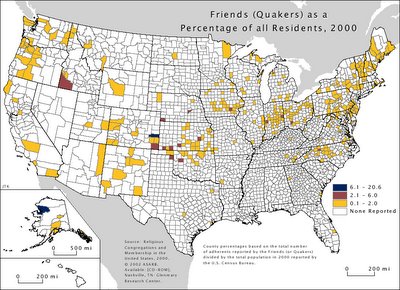100 years -- or is it 2000? -- of Pentacostalism
As I type, I'm listening to a fascinating discussion of Pentacostalism -- a 100 year old movement that now includes 500,000 of the 2 billion Christians in the world -- with Krista Tippett on Minnesota Public Radio's Mid-morning program. Here's a link that should take you to where you can listen for yourself, and to links to other background information. (I'm not sure how long this link will survive, but MPR keeps an archive of its programs and it would be available somewhere on its site with a little looking.)
If there was one word of the discussion that kept coming back again and again, it was "power." It would be hard for a Quaker to listen to this program and ask, "Why does this all sound so familiar?" It was for this one, anyway.
One of many insights she shared is that she is confident that the growth of Pentacostalism in Latin America is intimately connected with the political turn to the left in many countries in that region. (Not there, alas.) (I liked the joke she repeated: The Catholic Church has a preference for the poor, but the poor preferred Pentacostalism.) She connects it to the Power that Pentacostalism brings to its adherents, most of whom were previously disenfranchised. She also articulates the often misunderstood distinctions between Pentacostals and fundamentalists and evangelicals. I've been a big fan of Krista Tippett's for as long as her program, Speaking of Faith has been on the air and I highly recommend it to all. (I only wish it didn't overlap with our preparation for going to meeting on Sunday mornings. . . . but I can hear it again on Sunday evenings at 9.)
I've been a big fan of Krista Tippett's for as long as her program, Speaking of Faith has been on the air and I highly recommend it to all. (I only wish it didn't overlap with our preparation for going to meeting on Sunday mornings. . . . but I can hear it again on Sunday evenings at 9.)
Added a little later: Simultaneously with this post, and without prior consultation, Kwakersaur posted a very thoughtful essay on Pentacostalism and Quakerism that goes a lot deeper into the subject and points out very important differences.



